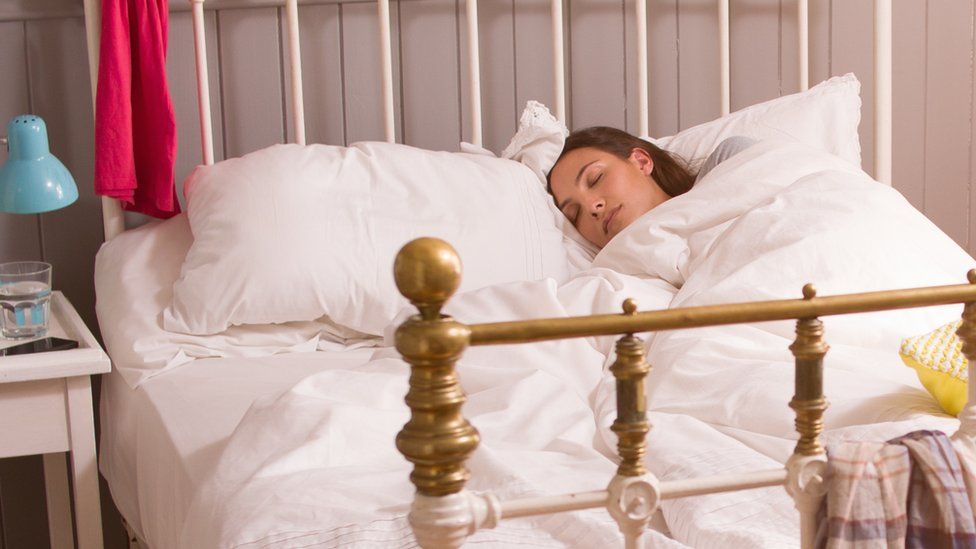Weekend lie-ins 'do not make up for sleep deprivation'
- Published
- comments

Weekend lie-ins do not make up for being sleep-deprived during the week, a study suggests.
Researchers took two groups of healthy people and limited their sleep to no more than five hours a night.
One group had their sleep restricted for the whole study, while the other was able to catch up at the weekend.
Both groups snacked more at night, gained weight, and showed signs of deteriorating metabolic health, compared to the start of the study.
"In the end, we didn't see any benefit in any metabolic outcome in the people who got to sleep in on the weekend," said lead author Chris Depner, an assistant research professor of integrative physiology at the University of Colorado Boulder.
Research has shown that too little sleep can increase the risk of a range of health problems, including obesity and type-2 diabetes, in part by boosting the urge to snack at night and by decreasing insulin sensitivity, or the ability of the body to regulate blood sugar.
For this new study, researchers wanted to find out what happens when people cycle back and forth between a sleep-deprived work week and two days of catch-up.
They took 36 people, aged 18 to 39, and for two weeks kept them in a laboratory, where their food intake, light exposure and sleep were monitored.
Although the numbers may appear small, experts said this was quite a large number of participants for a sleep study of this kind.
Participants were divided into three groups:
- one was allowed no more than five hours per night over nine nights (sleep-restricted group)
- the second was allowed no more than five hours for five days followed by a weekend when they could sleep as much as they liked before returning to two days of restricted sleep (weekend recovery group)
- and a third was allowed plenty of time to sleep - nine hours each night for nine nights (control group)
Both sleep-restricted groups gained a small amount of weight over the course of the study (slightly more than 2.2lbs or 1kg) and became less sensitive to insulin, according to the study, published in the journal Current Biology.
While those in the recovery group saw mild improvements at the weekend (including reduced night-time snacking), those benefits went away when the sleep-restricted work week resumed.
On some health measures, the weekend recovery group had worse outcomes.
Insulin sensitivity declined by 13% in the sleep-restricted group, while in the weekend recovery group it worsened by between 9% and 27%.
One problem was that the people who were given the opportunity to catch up on sleep struggled to do so.
In the end, the recovery group achieved only 66 minutes more sleep on average at the weekend.
'Regular schedule'
Experts not involved in the research said that although the effects on health shown in the study were small, it was possible that over months and years the impact could become large.
They said the findings reinforced existing advice that it is important to sleep enough during the week, and ideally keep a regular sleep schedule.
But if you are unable to keep to a regular sleep and wake time, it does not mean a lie-in is necessarily bad for you.
The study focused on how sleep restriction and catching up on rest at the weekend affects metabolic health, rather than, for example, mental health or cognitive ability.
Malcolm von Schantz, professor of chronobiology at the University of Surrey, added: "Whilst I think we should urge everybody to work towards a regular schedule if they can, I don't think we should tell people who don't have that luxury that they mustn't sleep in during the weekend."
- Published13 May 2018
- Published1 November 2017
- Published12 July 2017
- Published12 April 2018